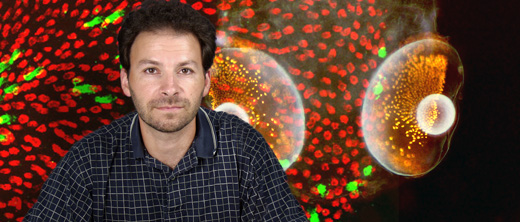
Our broad goals are simple: Uncover new genes and novel genes functions essential for the development of the eye and underlying degenerative disease of the visual system. We specifically investigate the specification, patterning and degeneration of the rod and cone photoreceptor, the light sensing cells in the back of our eyes. Our primary approach takes advantage of the oft cited benefits of the zebrafish as a model of vertebrate development and human disease. External development and the clarity of the zebrafish embryo enable an array of embryological and genetic manipulations including transgenesis, genome editing, and in vivo imaging for unparalleled cellular and molecular analyses of cell structure, function and neural regeneration in a vertebrate species.
Our current projects are divided into three overlapping areas of photoreceptor cell biology: The role of vesicle trafficking in cellular morphogenesis; gene regulatory networks that shape photoreceptor specification; and applying in vivo genome editing to engineer precisely defined zebrafish models of inherited retinal dystrophies. From these broad ideas, trainees address basic science questions or apply these to much more translation applications. For example, our novel models of retinal degeneration form the basis of small molecule and genetic screens to discover agents that promote photoreceptor survival and forestall vision loss. Our developmental models allow us to approach photoreceptor evolution with new insight or ask how changes in cell fate affect neural plasticity. Building off one of these projects, trainees gain technical expertise in zebrafish genetics, imaging and genomic methods, and begin the process of shaping their own independent project. I work with each to transform their ideas into testable hypothesis using multiple systems. I encourage each to seek-out additional training opportunities, become the expert and bring those approaches to our lab. And I look for off-campus experience to further their research programs and professional development.
My mentoring goals focus on assisting each trainee to take advantage of the research resources in my laboratory and opportunities at FSU to develop the technical expertise, critical thinking, communication skills and professional growth to build an independent project that they then use to launch their independent career.
